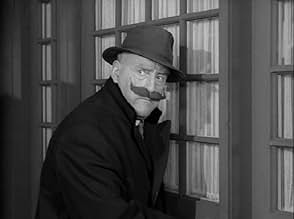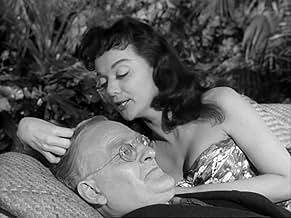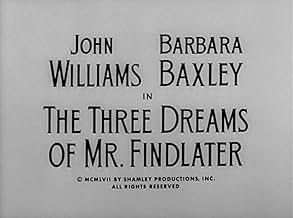Ernest Findlater is constantly nagged at by his wife so he fantasizes about Lalage, an exotic lover from the South Seas.Ernest Findlater is constantly nagged at by his wife so he fantasizes about Lalage, an exotic lover from the South Seas.Ernest Findlater is constantly nagged at by his wife so he fantasizes about Lalage, an exotic lover from the South Seas.
- Director
- Writers
- All cast & crew
- Production, box office & more at IMDbPro
Featured reviews
Straight out of the Walter Mitty textbook. We are led into the world of a dreamer who is constantly picked on by his verbally abusive and unappreciative wife. Women weren't treated very well in the fifties unless they were curvy sex objects. Well, there's one of those here too. The protagonist is stuck in his sense of morality. He would love to kill his wife and begin an adventurous life, but he would never do anything. In his reveries is a Tahitian treat. A Dorothy Lamour look alike who helps him make it from one day to the next by encouraging him to change his life. I found that I wasn't really attending much as this dragged on.
John Williams must have appeared in more episodes of "Alfred Hitchcock Presents" than nearly everyone...except for Alfred's daughter, Patricia. So, seeing Williams in an episode only a few after he starred in three straight isn't all that surprising.
In "The Three Dreams of Mr. Findlater", he plays Ernest Findlater, a mousy and rather dull man with a penchant for retreating into a dreamworld instead of interacting with his cold wife. In this dreamworld, Ernest dreams of a Polynesian girl, Lalage, and a nice tropical island. But she also appears to him at other times and they dream of being together and killing his wife. However, because Ernest is so mousy and timid, he always dreams and plans...but never actually does anything.
There is no twist, no coincidence, no 'Hitchcockian' moment in this one....just the man dreaming of being with his imaginary girlfriend and killing the wife....and nothing more. Interesting to watch but ultimately disappointing.
In "The Three Dreams of Mr. Findlater", he plays Ernest Findlater, a mousy and rather dull man with a penchant for retreating into a dreamworld instead of interacting with his cold wife. In this dreamworld, Ernest dreams of a Polynesian girl, Lalage, and a nice tropical island. But she also appears to him at other times and they dream of being together and killing his wife. However, because Ernest is so mousy and timid, he always dreams and plans...but never actually does anything.
There is no twist, no coincidence, no 'Hitchcockian' moment in this one....just the man dreaming of being with his imaginary girlfriend and killing the wife....and nothing more. Interesting to watch but ultimately disappointing.
"The Three Dreams of Mr Findlater" is the third and last episode directed by Jules Bricken. The first being "Alibi Me", which was pretty good if not exceptional. The other being "Conversation over a Corpse", which was great and one of the few great episodes of the first half of Season 2. The main reason as to why it was seen was for 'Alfred Hitchcock Presents' regular John Williams, always worth watching and good and more in all but one of his previous outings (the exception being "Whodunnit").
Didn't find myself particularly impressed by "The Three Dreams of Mr Findlater", and it is easily the weakest of Bricken's three 'Alfred Hitchcock Presents' episodes. Can't fault Williams, but the story never really came to life or properly engaged. As far as Season 2 goes, it is not quite one of the weakest episodes but to me it is somewhere around low middle. Average or less ratings and reviews have never been given with pleasure watching and reviewing the 'Alfred Hitchcock Presents' episodes, when disappointed by something it has always intended to be as thoughtful and honest as possible.
By all means there are good things. The best aspect is the performance of Williams, who excels in the type of role he played extremely well throughout his career and his role here plays to his strengths. The acting in general is well above average as is the chemistry between the actors.
Furthermore, Hitchcock's bookending nearly always delights in the series, and it continues to be amusingly ironic. There is some nice photography throughout, though not jaw dropping. The main theme for the series is suitably macabre and the audio doesn't jar or overbear. The premise was very interesting and promising and the episode did start off very well and intriguing.
However, "The Three Dreams of Mr Findlater" could have been a good deal better than it turned out. Just wish that that promise was maintained rather than run out of steam like the episode sadly did. The story drags in the second half from the plotting becoming thinner instead of intricate, and it lacks surprises and suspense (which was expected considering the premise). The ending is not much of one and is very predictable and extremely forgettable. Any revelations are far from big and coincidences are none.
While the script has thought provoking moments early on it generally lacks spark and could have been a lot tighter later on. Bricken's direction is very uninspired, an adjective that wasn't applicable to either of his two entries.
Concluding, another watchable but unmemorable episode. 5/10.
Didn't find myself particularly impressed by "The Three Dreams of Mr Findlater", and it is easily the weakest of Bricken's three 'Alfred Hitchcock Presents' episodes. Can't fault Williams, but the story never really came to life or properly engaged. As far as Season 2 goes, it is not quite one of the weakest episodes but to me it is somewhere around low middle. Average or less ratings and reviews have never been given with pleasure watching and reviewing the 'Alfred Hitchcock Presents' episodes, when disappointed by something it has always intended to be as thoughtful and honest as possible.
By all means there are good things. The best aspect is the performance of Williams, who excels in the type of role he played extremely well throughout his career and his role here plays to his strengths. The acting in general is well above average as is the chemistry between the actors.
Furthermore, Hitchcock's bookending nearly always delights in the series, and it continues to be amusingly ironic. There is some nice photography throughout, though not jaw dropping. The main theme for the series is suitably macabre and the audio doesn't jar or overbear. The premise was very interesting and promising and the episode did start off very well and intriguing.
However, "The Three Dreams of Mr Findlater" could have been a good deal better than it turned out. Just wish that that promise was maintained rather than run out of steam like the episode sadly did. The story drags in the second half from the plotting becoming thinner instead of intricate, and it lacks surprises and suspense (which was expected considering the premise). The ending is not much of one and is very predictable and extremely forgettable. Any revelations are far from big and coincidences are none.
While the script has thought provoking moments early on it generally lacks spark and could have been a lot tighter later on. Bricken's direction is very uninspired, an adjective that wasn't applicable to either of his two entries.
Concluding, another watchable but unmemorable episode. 5/10.
Bank manager Mr Findlater (John Williams) dreams of getting rid of his overbearing wife (Isobel Elston), aided by his dream woman Lalage (Barbara Baxley).
This episode is one of the more light-hearted ones. I always enjoy watching John Williams, but he really excels himself here - the way he expounds his second dream, doing all the voices, is brilliant. The whole episode is shown from his point of view, and he carries it wonderfully.
This isn't driven by atmosphere or suspense, but is great story telling. It's based on a story by A. A. Milne. I never liked Winnie the Pooh, but this makes me wonder if I should look at some of his other work.
Barbara Baxley is also good - both character-wise and physically - I wouldn't mind having her in my dreams...
Enjoy!
This episode is one of the more light-hearted ones. I always enjoy watching John Williams, but he really excels himself here - the way he expounds his second dream, doing all the voices, is brilliant. The whole episode is shown from his point of view, and he carries it wonderfully.
This isn't driven by atmosphere or suspense, but is great story telling. It's based on a story by A. A. Milne. I never liked Winnie the Pooh, but this makes me wonder if I should look at some of his other work.
Barbara Baxley is also good - both character-wise and physically - I wouldn't mind having her in my dreams...
Enjoy!
I keep trying to enlist the sarong-clad Lalage (Baxley) into my dreams but to no avail. But then poor businessman Findlater (Williams) probably needs her coy ministrations more than I do. What with his shrewish, ice-queen wife (Elsom), no wonder he retreats into a dream world whenever he can. Trouble is he can't seem to control the sarong temptress's comings and goings. So she keeps turning up at odd times, like hotel lobbies. Then too her half-clad posturings are about as seductive as 1950's TV gets. Anyhow, our dreamer keeps having a second unwilled fantasy where his wife dies a sudden, unproblematic death. But since that's not likely to happen, he and his dream girl embark on a murder scheme to escape the impossible wife.
It's tongue-in-cheek the whole way, with material more like The Twilight Zone than standard Hitch. It's also a slightly befuddled John Williams, unlike his usual authoritative roles. I'm not sure what the moral or lesson of the story is, unless it has to do with the power of wish-fulfillment. All in all, the story's a departure and likely a matter of audience taste.
It's tongue-in-cheek the whole way, with material more like The Twilight Zone than standard Hitch. It's also a slightly befuddled John Williams, unlike his usual authoritative roles. I'm not sure what the moral or lesson of the story is, unless it has to do with the power of wish-fulfillment. All in all, the story's a departure and likely a matter of audience taste.
Did you know
- TriviaThe story for this episode was written by A.A. Milne, the creator of Winnie the Pooh.
- GoofsDespite being set in The UK, the telephone in the club rings in the US way (one long ring instead of 2 short ones).
- Quotes
Self - Host: [afterword]
Psychiatrist in Introduction: [Hitchcock is snoring on the psychiatrist's couch. The psychiatrist looks exasperated. He leans in to look closely at Hitchcock, then turns to the camera with a shushing gesture] Shhh...
- SoundtracksFuneral March of a Marionette
Written by Charles Gounod
Details
- Runtime30 minutes
- Color
- Aspect ratio
- 1.33 : 1
Contribute to this page
Suggest an edit or add missing content

Top Gap
What is the Spanish language plot outline for The Three Dreams of Mr. Findlater (1957)?
Answer












